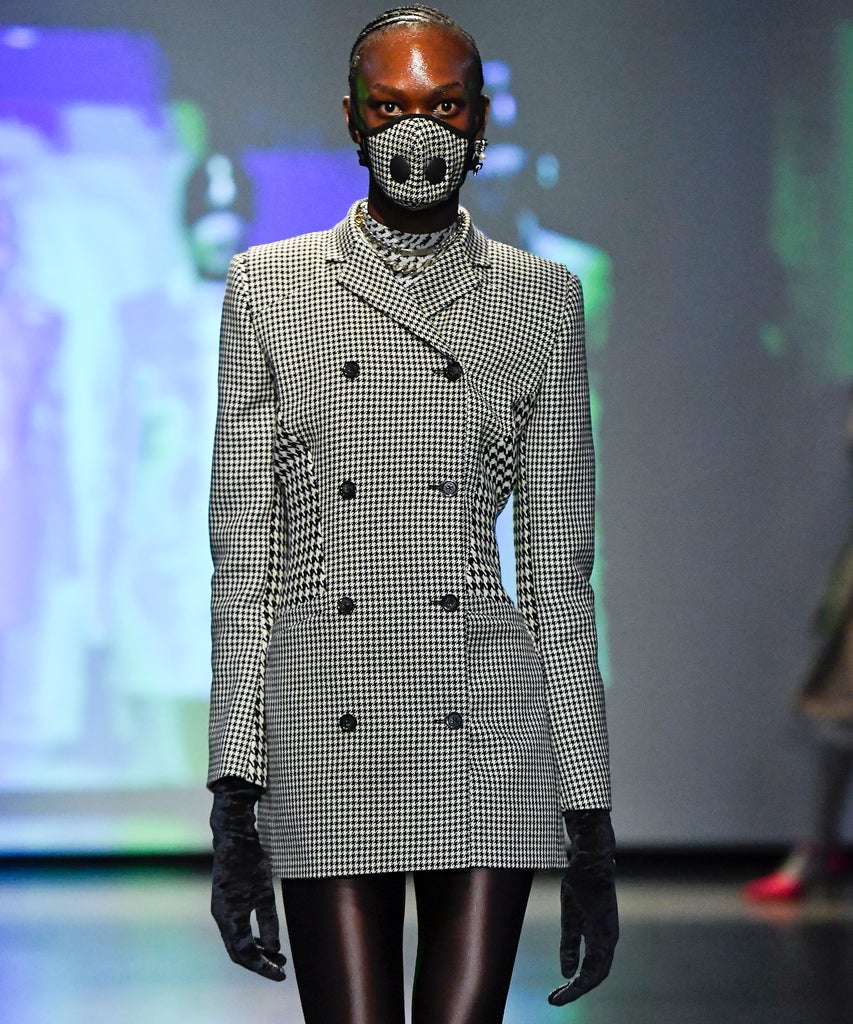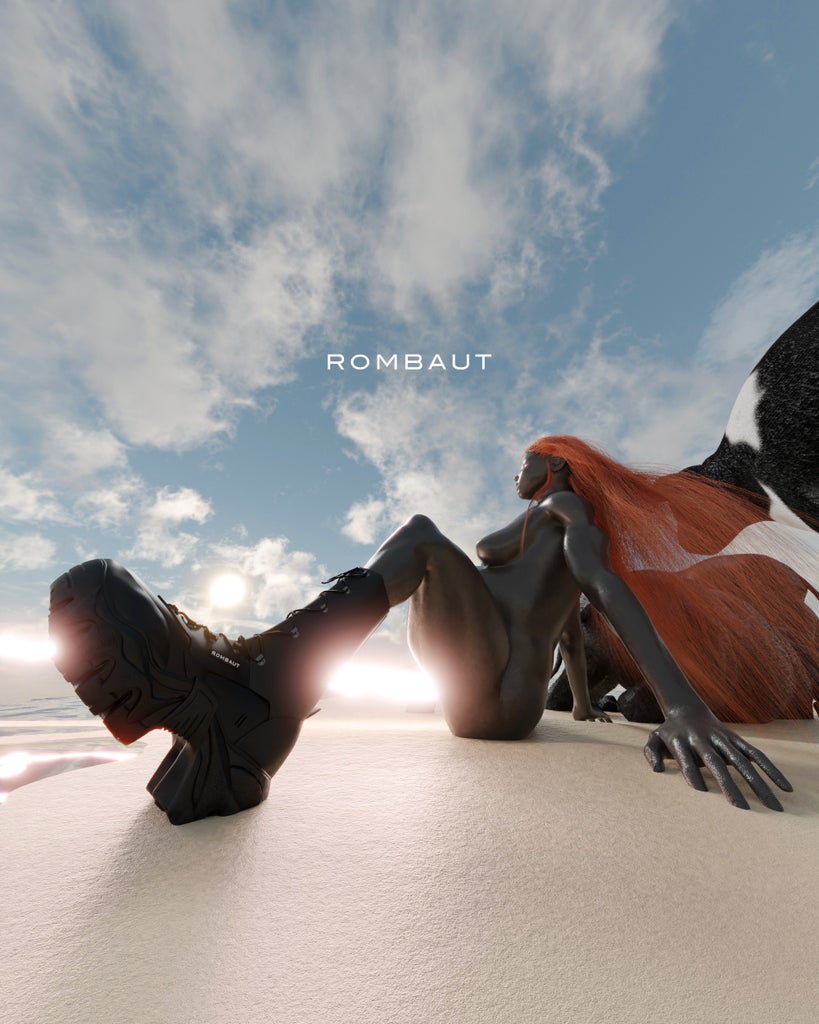
2020 has been a devastating year — more than 1.7 million people have died from COVID-19, millions are out of work and struggling to pay their bills, and, running through it all, there were record-breaking natural disasters fuelled by climate change. Understandably, that has created a number of complex emotions, and, as result, existentialist musings — some of which fashion is now (quite literally) wearing on its sleeve.
At the start of this year, Korean fashion brand Harlan + Holden opened an “Existential retail” experience in Seoul, urging customers to spend less time shopping and more time pondering “what truly matters,” while Marine Serre showed a dystopian Fall 2020 collection that simultaneously tackled death and love of life. In March, Parisian vegan footwear brand Rombaut released a collection that depicted apocalyptic-style climate imagery. Rick Owens and Balenciaga also got dark for Spring 2021. On the product side, there are now Online Ceramic’s “We’re all going to die” tees and stickers, as well as Jiwinaia’s “Numb” earrings. The fashion industry, it seems, is taking inspiration from the existentialist movement — that flourished in Europe in the 1940s and 1950s and was popularised as self-description by thinkers such as Jean-Paul Sartre, Martin Heidegger, and Gabriel Marcel — and is more interested in exploring death and, ultimately, the meaning of life.
Iva Paska, Ph.D., a sociologist from the University North in Croatia and founder of Existentia, a website born from Paska’s own existential questions and research, views this as little surprise. “Times like these invite us to rediscover the teachings of existentialism,” she says. “Within current circumstances, it seems as if all these things that we usually take for granted are called into question. As if the rug of existential weaving that holds our everyday life is now being pulled under our feet and we are starting to see beneath it… death, illness, aloneness.”
Mirroring that sentiment, Mats Rombaut, founder and creative director of Rombaut, says the Spring-Summer 2020 dystopian imagery was inspired by reflection about the current state of the world. “[And] not just the recent pandemic either, which is just a consequence of how we have mistreated this planet for a long time,” he tells Refinery29. “I think everyone had to think in an existentialist way during these uncertain times.”
From experience, Rombaut says existentialism can prompt a fashion brand to evaluate its future, asking questions like: Where do we go from here? Does it make economic sense to continue? Does it make sense for humanity to continue like this? If not, how can we change? He predicts that the “real existentialism still has to show” with more brands closing down.
This is already taking place as chain retailers, department stores, and small designers alike struggle to stay afloat, with 2020 bringing a consecutive list of closures, including Century 21, Sies Marjan, Totokaelo, and Need Supply. It’s also evident through brands like Gucci, Saint Laurent, and more leaving the archaic Fashion Month calendar that encourages brands to produce collections at lightning speed that leaves little room for creativity and creates more clothing than we can ever wear in our lifetime. Amongst the mass layoffs of retail workers, and the cancellation of roughly $1.5 billion worth of orders (approximately £1.2 million) from an industry that relies on more than 150 million underpaid workers in lower-income countries (predominantly BIPOC women), the pandemic has poked enough holes in the fashion industry’s unsustainable production model that it’s becoming increasingly impossible for people to ignore. Naturally, this leads to an existential reevaluation of fashion’s entire purpose.

Rombaut’s latest collection, “Next Life,” centres around the human struggle for survival. “The personal mental struggles humans go through, the general mood of depression, and current health of the planet,” he adds. “These were themes already present in the collection and in the Rombaut narrative before the pandemic hit.” These themes have also previously been explored by brands like Collina Strada, a label that has long highlighted the issue of climate change while sending messages of hope and optimism. This is also Rombaut’s approach, too, asking questions like: Will the next generation do better?
Marilynn H. Johnson, Ph.D., Assistant Professor at the University of San Diego’s philosophy department — who is currently working on a book that explores the philosophical meaning of bodily adornment, including clothing — notes that it’s not uncommon for existential thoughts, brought on as a result of an unprecedented event, to eventually take a turn for the positive and inspire people to appreciate life.
“As you look throughout history at the time after people have been controlled, there’s a big boom in terms of fashion and people living it up,” she says. Think, for example, the Roaring Twenties, with its celebratory flapper aesthetic, following WWI. Or the upbeat tie-dye and psychedelic prints of the ’60s that people wore as they expressed their opposition to the Vietnam War and support for the Civil Rights Movement. “People will get sick of feeling numb, and there’ll be a backlash in the other direction,” says Johnson.
Ian Olasov, Adjunct Professor of Philosophy at Brooklyn College and Medgar Evers College and author of Ask a Philosopher, says it’s easy to understand the connection between fashion and existentialist messaging. “It’s not hard to see people’s relationships to their own mortality growing with existential threats. The type of fashion trends you’re talking about are invitations for some sort of authentic connection with other people,” he says. “I could imagine people wearing ‘numb’ earrings ironically, but I could also imagine it as a sort of sincere bid for connection.”
While fashion has a looser definition of it, Olasov reminds us not to always associate existential thinking with morbidity, and not to confuse it with nihilism. While existentialism suggests that we can construct our own meaning within a world that has none, nihilism is the belief that not only is there no intrinsic meaning in the universe and it’s pointless to even try to construct our own.
“Existential means different things to different people so, for some people, it’s orienting your life around mortality or morbidity,” he says. “But in some existential philosophy, there’s a connection between authenticity being in light of your mortality. That kind of honesty about the facts of the situations you find yourself in and the honesty about your own freedom and responsibility in dealing with them.” This concept of authenticity is something, he explains, is currently appealing to a lot of people. He also points to stoicism — a concept that encourages living in accordance with nature — which he’s seen an increasing interest in, as offering people a way to deal with intense emotions.
While it’s evident that the rise in existentialist thought as a result of the pandemic is seeping its way into our fashion choices (and no doubt will continue to rear its head across T-shirts, new shopping experiences, and sneaker campaigns as we enter the new year), it doesn’t mean that we’re caught in a negative spiral with no way out. Instead, it may be indicating a desire for connection and a growing interest in questioning why things and outdated systems still exist. This could be particularly important for the future of an industry that has long excluded people and encouraged overproduction and overconsumption over sustainability — and needs to change.
As Sartre put it, “Life begins on the other side of despair.” If fashion is currently in despair, it means that new life, designs, and ideas are on their way.
Like what you see? How about some more R29 goodness, right here?
Lingerie As Outerwear Is Trending On Instagram